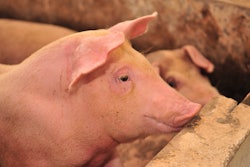
Over the past week, the authorities in Montenegro have officially recorded the nation’s first ever cases of African swine fever (ASF).
Testing positive for the virus during the second week of January were two wild boar, according to the notification to the World Organisation for Animal Health (WOAH).
Their carcasses were found in the western municipality of Niksic, around 500 meters from the border with Bosnia-Herzegovina. ASF is known to have been circulating in that country since June 2023.
Albania and Slovenia are now the only Balkan states in southeastern Europe yet to record the presence of the ASF virus.
Italy: 12 provinces now affected, new genotype on Sardinia
Two other significant developments in the spread of ASF within Europe have occurred recently in Italy.
Based on a report to WOAH from the animal health agency, first cases of infection with ASF virus of genotype II have been confirmed in Sardinia. Whereas the disease caused by genotype I has become endemic on the island, an outbreak in September 2023 in a small herd was linked to the genotype II. It is this latter variant that has been circulating ever more widely across Europe — and globally — in recent years.
Source of the virus is attributed in the notification to “meat products,” so possibly the feeding of untreated food waste to the small closed-cycle farm’s 13 pigs. Three of them died, and the rest have been destroyed. The authorities have declared the outbreak series “resolved,” presumably based on the absence of any further cases.
Also in Italy, the first ASF case has been detected in the province of Asti. Testing positive for the virus this month was a wild boar.
Located in the region of Piedmont, Asti is the 12th Italian province to confirm the presence of ASF over the past two years.
New cases in pigs confirmed in 5 European countries in 2024
As of January 14, four of the region’s nations have registered ASF outbreaks in domestic pigs this year with the European Commission (EC). Its Animal Disease Information System monitors the progression of notifiable animal diseases in member states of the European Union (EU) and most of the adjacent countries.
Of the total of eight outbreaks in this category for the year to date, Romania and Serbia have each registered three outbreaks, and Greece and Ukraine one.
Further details of these events are included in notifications from the national veterinary agencies to WOAH.
The outbreak in Greece was at a farm with 174 swine, where eight of the animals died. The rest have been destroyed at the premises, which was the first to be hit by ASF in the region of Eastern Macedonia and Thrace, and the country’s first outbreak for six months.
In Romania, two small herds in the south of the country with a total of eight pigs are the latest to have ASF cases reported to WOAH.
Around the turn of the year, ASF outbreaks were confirmed in two backyard groups of pigs in the Federation of Bosnia and Herzegovina — one of the three entities comprising Bosnia-Herzegovina. Latest WOAH reports indicate both represented the first to be hit by the disease in the cantons of Zenica-Doboj and Western Herzegovina.
Wild boar outbreak total passes 300
Already by January 14, the number of ASF outbreaks in wild boar reported to the EC’s System had reached 330. This is the total reported in 13 European nations.
Registering the most outbreaks so far has been Bulgaria (with a total so far of 80), followed by Poland (69), Italy (54), Lithuania (33), Hungary (26) and Latvia (25). Also reporting cases since the previous week’s update were Croatia, the Czech Republic (Czechia), Estonia, North Macedonia, Romania and Slovakia.
Among the additional outbreaks notified to WOAH over the past week are the first cases in Montenegro and in the Italian province of Asti mentioned above. Furthermore, a total of six wild boar have tested positive for the ASF virus in Bosnia-Herzegovina.
As of January 5, the total number of ASF-infected wild boar in Germany was 5,610, according to national veterinary agency, the Friedrich-Loeffler Institute. Of these, 13 were detected over the previous 28 days. Germany’s first ASF cases were reported in September 2020.
Proposed port inspection cuts alarm UK pig industry
Government plans to cut the budget for the seizure of unregulated pig meat imports has caused alarm bells to ring in the United Kingdom (U.K.).
Industry body the National Pig Association (NPA) has joined with others calling on the agriculture department, Defra, to reconsider its position. It had previously proposed a cut of 70% to the budget for keeping ASF out of the country. Also supporting the NPA are the Dover Port Health Authority and Dover Council.
In September 2022, new regulations were introduced in Great Britain to make it illegal to bring in more than 2 kilograms of pork or pig meat products, unless produced to and certified as EU commercial standards. Since the rule was introduced, the authorities have seized more than 57 metric tons of uncertified meat products.
Commenting on the proposed funding cut, NPA chief executive Lizzie Wilson said it would leave the national pig industry exposed to an ASF outbreak that could be catastrophic for the sector.
To date, ASF virus has never been found in the U.K.
View our continuing coverage of the global African swine fever situation.

















